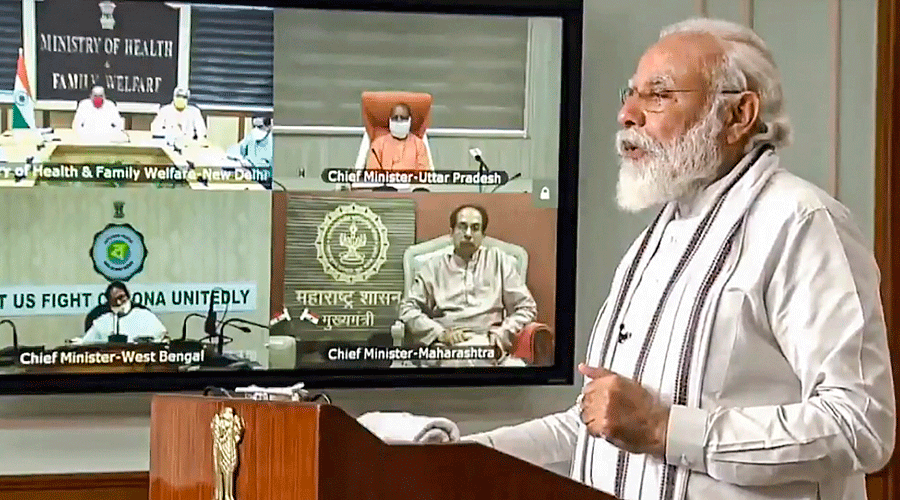India will seek to double its testing capacity to diagnose the new coronavirus from the current 5 lakh samples to 10 lakh samples daily, Prime Minister Narendra Modi said on Monday, inaugurating three high-throughput facilities in Calcutta, Mumbai and Noida.
The facilities — high-speed automated machines — procured and installed at Indian Council of Medical Research labs in the three cities are expected to collectively increase their capacity by 10,000 tests per day, the Union health ministry said.
The automated machines that will enable processing more samples with fewer human resources are located at the National Institute of Cholera and Enteric Diseases (NICED), Calcutta, the National Institute for Research in Reproductive Health, Mumbai, and the National Institute for Cancer Prevention and Research, Noida.
The NICED’s current capacity is between 1,000 to 1,100 tests per day.
Modi, who launched the three facilities via video conferencing, said it was imperative for India to develop corona-specific health infrastructure at a fast pace. India’s number of labs equipped to test for Covid-19 has increased from only one in January to more than 1,300 in July.
Efforts are underway to increase the capacity to 10 lakh samples in the coming weeks, the Prime Minister said.
The existing network — 906 government and 404 private labs — had on Sunday collectively tested around 515,000 samples, according to the health ministry.
Attempts to double the capacity would mean adding more labs to this network, a senior scientist at the ICMR said. “The number of labs has increased within four to five months, but we actually need far more than 1,300 labs.”
Public health experts say the need for more testing capacity is evident from variations in the number of tests conducted per million population in the country. India’s overall figure is 12,179 tests per million population, compared with 164,000 per million in the US or 59,000 tests per million in Brazil.
Across India’s states, the number of tests conducted varies from 79,955 per million population in Goa to 47,103 in Delhi to 8,258 in Bengal and 3,762 in Bihar, according to data from the National Institute of Epidemiology, Chennai.
The health ministry had earlier this month said Bengal, Bihar, Telangana and Uttar Pradesh are among states that were testing below a “threshold” for “comprehensive testing” set by the World Health Organisation.
“This commitment to adding testing capacity is welcome and long overdue,” said a senior community medicine specialist who, among others, has since early April argued for a greater testing capacity and widened criteria for testing.
The ICMR on June 23 expanded testing criteria making it possible for anyone with influenza-like illness symptoms anywhere in the country to seek a Covid-19 test. But scientists point out that vast sections of the population, particularly in rural areas, do not have close access to testing facilities.
“The antigen tests yield quick results and can be done in the field without the need for a sophisticated lab network,” said the ICMR scientist. Such tests should be made available through rural health workers.”










